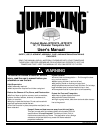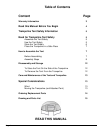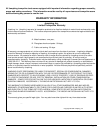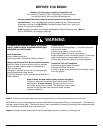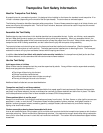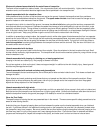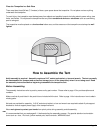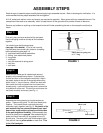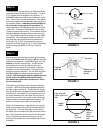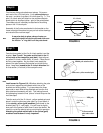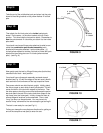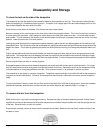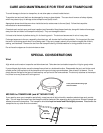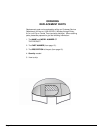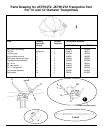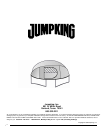
Page
6
Electrocution hazard associated with the metal frame of trampoline
The frame of the trampoline is made of metal. It is not grounded, and it will conduct electricity. Lights, electric heaters,
extension cords, and household electrical appliances are not permitted in the trampoline tent.
Hazards associated with the raised tent floor
Unlike traditional tents, the floor of this tent does not rest on the ground. Instead, the trampoline tent floor provides a
smoother, more comfortable surface than the ground. The space under the tent should not be used for storage or as a
place for heaters or other sources of heat or flame.
A trampoline tent, which is raised off the ground, increases the risk of a fall when going out the tent door compared with
tents that rest directly on the ground. Darkness increases the chances of a fall when getting in and out of the tent, so be
especially cautious at night. Young children in particular may have difficulty getting in and out of the tent, especially after
dark. If the tent is being used at night, provide a source of lighting near the tent door, or at least keep a flashlight in the tent
to use to light the exit. Help young children to get in and out of the tent to reduce their risk of falling.
In addition to presenting a raised surface, the trampoline tent is unlike other types of tents because the floor is a separate
piece from the rest of the tent. Even though the floor and walls are separate pieces, tent users, particularly young children,
are not allowed to leave the tent by going out between the tent floor and the tent walls. Trying to exit in this way poses a
risk of strangulation from being caught between the trampoline’s frame and the tent wall. Only the door of the tent is to
be used to enter and exit the tent.
Hazards associated with hot days
On hot days, it can get much hotter inside the tent than outside. Open the windows in the tent to reduce the heat. Small
children can be harmed by high temperatures. The trampoline tent should not be used as a place for young children to nap
when the weather is hot.
Hazards associated with jumping in, climbing on, or leaning against tent
Jumping in the tent can cause injury. No jumping is allowed in the tent.
Do not lean against or climb on the tent; it does not support weight. In addition to the risk of bodily injury, these types of
activities may damage the tent itself.
Hazards associated with animals and sharp and glass objects
To avoid damage to the tent and trampoline, do not allow pets or other animals inside the tent. Their claws and teeth can
damage the fabric.
Glass objects can break, producing small pieces that can cut people and the fabric of the trampoline and tent. Sharp
objects such as knives and pens may also pose a risk of injury to people and to the trampoline and tent. Keep glass
objects and sharp objects out of the trampoline tent.
Hazards associated with high winds
All tents used outside can be blown about in high winds, and this can potentially injure anyone in their path or inside a tent.
Both the tent and the trampoline can be blown over in high or gusty winds. Under such conditions, take down the tent and
stake the trampoline frame to the ground (see page 13 for details) or move it to a sheltered location.
Store the Tent Safely
The specific steps for storing the tent are presented later in the manual. There are some specific safety precautions to be
aware of when storing the tent.
Avoid pinching your fingers by keeping them out from between the poles near the bracket assembly when you fold back
the tent. If you store the tent in the attached tie string pouch on the trampoline, be sure that it is completely tucked under
the trampoline, away from jumpers. Be sure to remove the tent floor before using the trampoline, because jumping on the
tent floor may result in injury to the jumper and it may damage the tent floor. Once the tent floor is removed and before
jumpers use the trampoline, inspect the trampoline mat (bed), and make sure it is clean and has no holes or tears.



